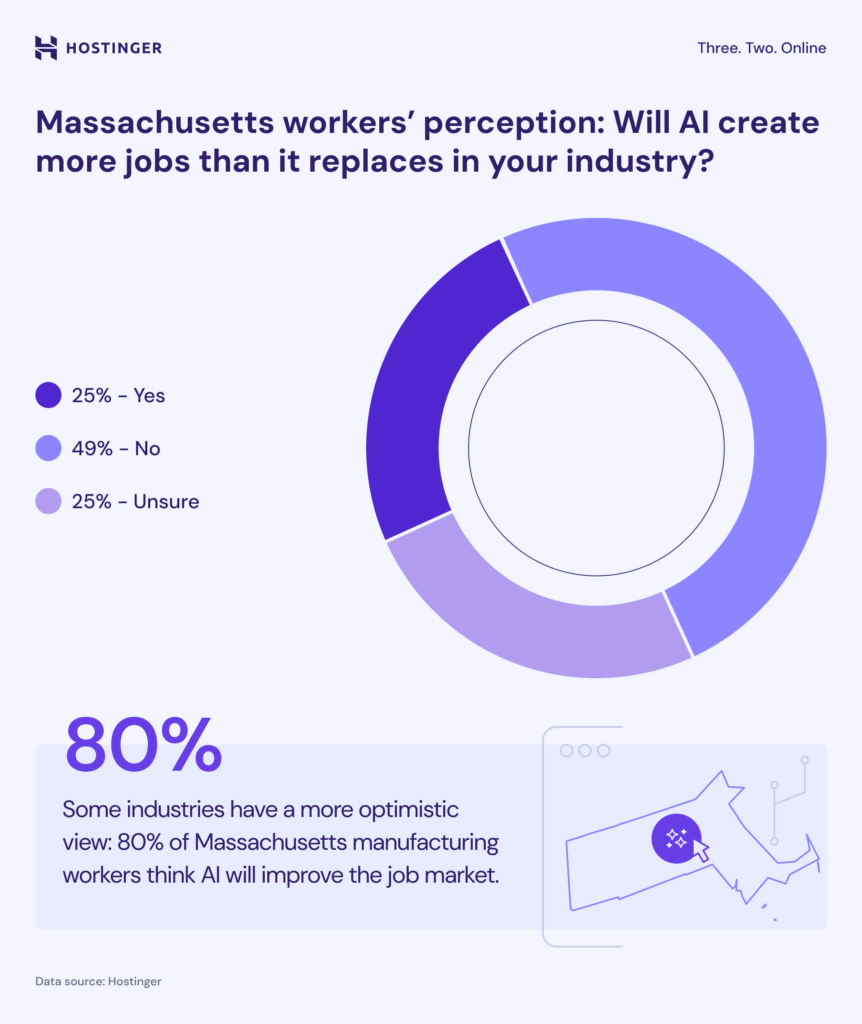It’s time for a synthetic intelligence (AI) influence actuality verify. Hostinger checked out key outcomes from a survey about staff’ perceptions of the influence AI is predicted to have on the Massachusetts job market.
The survey explored workers’ issues about how AI will have an effect on expertise, information, development, regulation, and the job market basically.
Employees’ most shared worry: AI taking your job


Of the matters within the survey, the first worry amongst Massachusetts staff is that AI will substitute human jobs. 42% of respondents fear expertise will substitute people in sure roles. The survey reveals a better worry amongst youthful staff in comparison with older ones, as 52% of staff aged 18-24 and 50% of these aged 25-34 view this as a serious difficulty. Nevertheless, this falls to 35% amongst these aged 45 to 59.
For respondents on this New England state, moral points and lowered wages rank because the second and third most prevalent issues.
Time to find out about AI
In Massachusetts, 57% of staff agree on the necessity to be taught new instruments and applied sciences pushed by AI adoption. This majority consensus exists throughout respondents’ industries.
Greater than 60% of staff in finance (together with insurance coverage), manufacturing, IT providers, actual property, and tourism acknowledge the necessity for additional schooling about synthetic intelligence.
Employees in a number of industries not intrinsically associated to tech and digital transformation have a tendency to precise doubt concerning the necessity of including AI expertise to their resumes. Greater than half of staff from the artistic arts and design, nonprofits and social providers, and retail aren’t planning so as to add extra AI-related expertise.
Are staff comfy with AI?
Dozens of AI instruments can be found on-line. Since OpenAI’s ChatGPT launched in 2022, AI consumer development has elevated every day. 31% of staff within the Bay State imagine they know extra about synthetic intelligence than the common particular person. Solely 7% contemplate themselves specialists within the discipline. The remainder, six out of 10 respondents, declare they know the fundamentals of synthetic intelligence.
Concern of AI? Most are taking motion to be taught and adapt
The information reveals that staff who worry job displacement by AI acknowledge the necessity to adapt. Greater than half (56%) of the employees with this worry imagine in studying new AI expertise.
Moreover, 65.5% of those that worry AI may substitute them at work asserted they know the fundamentals, and 31% expressed ‘figuring out greater than a mean particular person’ about AI.
Employees with this concern are primarily within the following sectors:
- Healthcare (15%)
- IT (13%)
- Finance (11%)
- Retail (11%)
- Non-profits/social providers (10%)
“AI is altering the best way we carry out quite a few job duties. Employees throughout varied industries will doubtless welcome streamlined processes and elevated automation. Nevertheless, it’s essential for everybody to acknowledge the training curve concerned, which ought to be considered not as an insurmountable impediment, however as a problem to foster new and improved options,” states Povilas Krikščiūnas from Hostinger.
How is AI’s affect on jobs perceived?
Hostinger’s survey examined sentiment relating to AI’s potential impact on jobs. Just one out of 4 respondents believes AI will create extra jobs than it replaces in any trade. Conversely, contributors reported:
- 49% imagine synthetic intelligence is not going to create new jobs
- 25% are not sure about it
This development remained constant throughout all age teams and most industries.
Massachusetts-based manufacturing and IT staff specific a extra optimistic view relating to AI’s influence on future job creation. Particularly, 54% of producing and 46% of IT workforces imagine AI will generate extra jobs than it would substitute.
When varied age teams, folks between 35 and 44 argue that AI may have a constructive impact on the job market. Alternatively, practically 40% of younger adults aged 18-24 and people between 45 and 54 are not sure about what the influence can be. Folks between 25 and 34, nevertheless, are equally divided between teams who imagine in a greater, worse, or unknown situation.
80% of producing staff are optimistic about AI


4 out of 5 staff from the manufacturing trade expressed optimism that AI will enhance the job market, and the vast majority of IT staff (60%) imagine the identical. These from different industries have a look at AI’s position within the job market as unsure or clearly adverse.
On common, 39% of staff in Massachusetts imagine this new expertise will create higher job alternatives, whereas 28% predict it would have a adverse influence and 33% expressed uncertainty.
AI is advancing quick
Lastly, the examine inquired concerning the velocity at which AI is advancing and the interval of adaptation that staff must take care of. 55% of respondents imagine synthetic intelligence is advancing too quickly for staff to adapt.
General, it’s believed that AI will considerably influence jobs, and that staff’ adaptability will considerably form the way forward for most industries. In durations of uncertainty, folks’s motivation and notion might affect a sooner or slower development.
Massachusetts’s enterprise and financial surroundings clearly exemplifies tendencies in ‘white-collar’ states. Within the ‘Bay State,’ workers working in industries with no ‘blue-collar’ jobs signify practically 75% of the state’s whole workforce. In line with the US Census Bureau, Massachusetts’s employment charge is 64%, and the median family earnings is $99,858 per 12 months. Though it is without doubt one of the smallest states within the nation, these numbers are above the nationwide averages.
Methodology
- The examine gathered 400 responses in the course of the first two months of 2025 and is a part of the Decoding Developments sequence of quick research led by Hostinger.
- Check out the solutions right here.







![Ought to I Take Social Safety Early? [10 Reasons Why Not To] Ought to I Take Social Safety Early? [10 Reasons Why Not To]](https://i2.wp.com/www.whitecoatinvestor.com/wp-content/uploads/2022/04/10-Reasons-NOT-to-Take-Social-Security-Early-1.png?w=75&resize=75,75&ssl=1)


